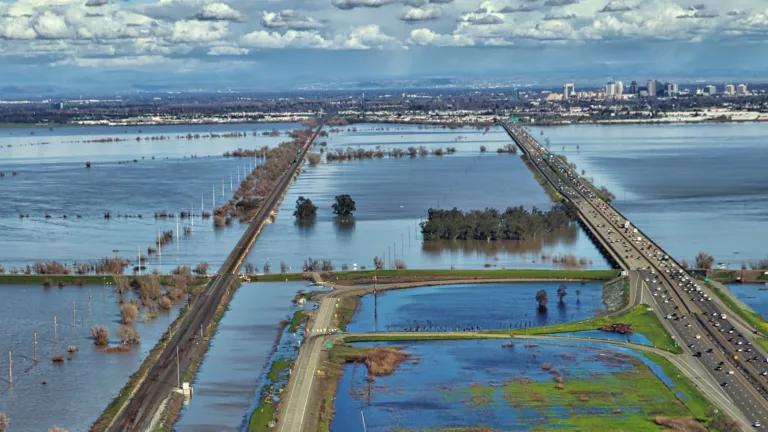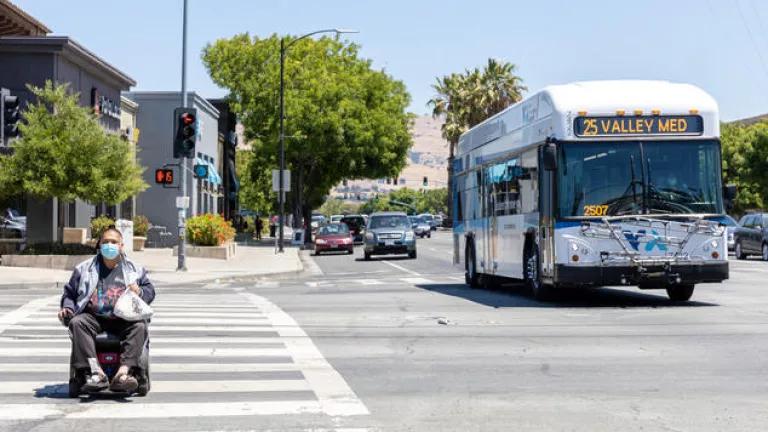Five Bills to Make California Streets Healthier and Safer
Five bills await Governor Gavin Newsom's signature would transform California's streets to make them healthier, safer and more accessible for all.

San Francisco MTA via Flickr
Update: Assembly Bills 43, 773 and 917 were signed into law. We look forward to working with California cities to use these new tools to bring safer and more accessible streets to residents. Assembly Bills 1238 and 122 were vetoed by Governor Newsom. We will continue to advocate for policies that eliminate unfair citations for walking and biking.
Californians walking, rolling, taking transit or driving around the state have a lot to be thankful for in the recently-concluded state legislative session.
The California Legislature passed five key bills that collectively represent a sea change for our roads and highways that will make them safer, more fair and more conducive to getting around in climate-friendly ways.
AB 43 (Friedman) - Speed limit reform
For decades cities have been forced by antiquated state laws to set speed limits based on the driving habits of the most reckless 15% of California’s drivers. Here’s a longer look from Streetsblog USA at that practice, dubbed the “85th Percentile Rule” after the driver speeds that have determined speed limits. AB 43 requires that cities take into account the presence of vulnerable groups, including children, seniors, the unhoused and persons with disabilities when setting speed limits, and would permit cities to reduce speed limits on streets with a track record of traffic safety issues.
AB 1238 (Ting) - Jaywalking reform
Stretching back to the early days of the automobile, the crime of jaywalking was invented with heavy PR backing from automobile interests to take streets away from pedestrians and turn them over to cars. These days, the crime of jaywalking is often a pretext to stop and search people of color. Recent analysis from KPCC/LAist found that Black residents of Los Angeles receive 31.5% of the jaywalking citations, but make up only 9% of the residents of the city. AB 1238 still requires pedestrians to use due care for their safety and the safety of other road users, and those who cross the street when it’s not safe can still be cited.
AB 917 (Bloom) - Automated bus lane enforcement
This bill allows cities and transit agencies to use automated parking enforcement of their dedicated bus lanes, building on a program already in place in San Francisco and Alameda Counties. Drivers who park in bus lanes delay low-income riders and essential workers who take transit. And blocked up bus lanes cost transit agencies money by keeping bus drivers tied up in traffic, which drains local and state transit funding. Bus riders on L.A. County Metro’s system have a median household income of $18,000 per year and a late bus can mean a missed shift at work, a late arrival to class and less time with family. The bill includes common sense fairness provisions: transit agencies will have to broadly announce a new bus lane enforcement program and only issue warnings for 60 days. Consistent automated enforcement will keep bus lanes free of parkers in a way that doesn’t create unnecessary interactions between law enforcement and the public.
AB 122 (Boerner Horvath) - Bikes can treat stop signs as yield signs
People who bicycle regularly know that prudently navigating stop signs can mean rolling gently through an intersection to maintain momentum if no pedestrians or cars are present. This practice, though extremely common, has been technically illegal. And like many traffic laws, it’s often misused as a pretext to stop people of color just trying to get safely to jobs, school and family. Notwithstanding AB 122, traffic officers would still be allowed to cite people biking if they blow through stop signs in a way that endangers others.
AB 773 (Nazarian) - Cities can limit cars on local streets to create "slow streets"
This bill builds on the momentum of programs during the COVID-19 pandemic to turn neighborhood streets into safe outdoor spaces for transportation and recreation. Residents of cities large and small up and down California enjoyed calmer local streets over the last year plus. In Los Angeles alone, the city received 175 applications from neighborhoods that wanted signs and barricades installed to slow drivers and make certain streets local traffic only. With AB 773, cities would be able to deliver on the public’s support for slow streets and make these programs permanent by officially lowering speed limits on certain local streets and designating them local traffic only with permanent signs.




